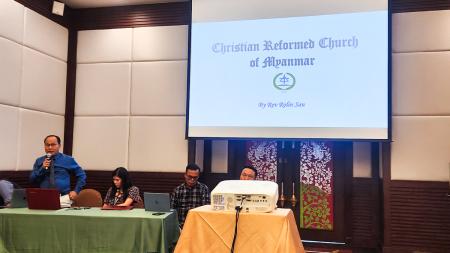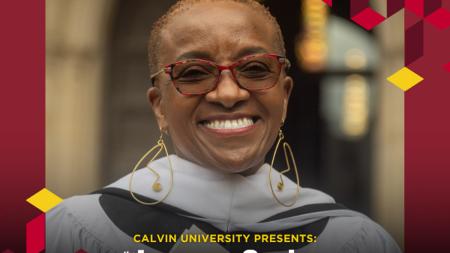First Students in Hispanic Ministry Program to Graduate

Students in Calvin Seminary’s Hispanic Ministry program
Rev. Angel Ortiz will be one of 36 West Michigan-area Hispanic pastors who will graduate this weekend from Calvin Theological Seminary’s new certificate program in Hispanic Ministry.
Ortiz and his fellow students attended classes for nearly three years, usually meeting once a week in the evening or on Saturdays, to earn their certificates.
“The program has been very important for me and others,” said Ortiz, pastor of a Pentecostal Church of God congregation and a leader of Hispanic pastors in Grand Rapids, Mich.
Ortiz and fellow students will join a total of 106 seminary graduates who will participate in ceremonies starting at 11 a. m. on Saturday at the Calvin College Covenant Fine Arts Center.
“The program has helped to give us a stronger foundation for ministry and taught us leadership skills,” said Ortiz. “It has taught me how to connect with my community in better ways.”
Calvin Seminary, in conjunction with the DeVos Foundation, launched the Certificate for Ministry Program in the fall of 2012, said Mariano Avila, professor of New Testament at the seminary.
“The program came as the result of consultations we held with local Hispanic pastors about four years ago,” said Avila.
“Since they play a key role in their communities, we met with the pastors to determine their needs and desires to be trained in areas of ministry.”
At the suggestion of local pastors, the program offers courses ranging from pastoral counseling and community transformation to preaching and church administration.
Also at the suggestion of pastors, the program is taught in Spanish and has a particular emphasis on being “culturally attuned and relevant.”
“It is taught by Hispanic professors who live and understand the realities of the culture of Hispanic churches and communities,” said Avila.
Courses have been taught by local experts in Hispanic ministry. Meanwhile, some of the best Hispanic scholars from across the country were also brought in to teach, said Avila.
For everyone, this first time around was a learning process.
“Given the diversity of our cohort, we have learned to adapt our teaching methods to the possibilities, limitations, challenges and considerable experiential assets of students,” said Avila.
Students have come from a range of churches, including many from Pentecostal or neo-Charismatic independent churches as well as the Christian Reformed Church, the Reformed Church in America and Baptist and Methodist churches.
“We had pastors who have been pastors of churches for many years, new pastors, and church planters,” said Avila. “They were already active in their churches and have been able to put what they learned in the classroom to immediate use.”
Of the pastors in the program, 80 percent had no formal theological training; many of the remaining 20 percent attended different Bible institutes but did not receive the same level of training offered by the seminary, said Avila.
A big plus of the program has been how it brings Hispanic pastors together.
“Before coming to the seminary, most of the pastors worked isolated from each other and distrusting others,” said Avila.
From the very first course on Ephesians with its strong emphasis on unity in the church, he said, “most pastors started to change their attitudes and now, after being together, they trust each other, cooperate, share their pulpits, and their prayers,” he said.
Sixty percent of the students in this initial class were men and 40 percent women and generally serve poor churches in the Grand Rapids area.
The seminary, with assistance of the DeVos Foundation, covered the cost of the tuition.
“This is very important,” said Avila, “since ninety-five percent of the students must work full-time to support themselves and their families.”
The seminary and the DeVos Foundation also cover the cost of visiting professors.
Some of those receiving certificates are going on for graduate study at the seminary. Other students are taking classes as the next semester gets underway.
“I am so grateful and feel blessed that we have been able to offer this program,” said Avila. “I believe we have been able to help these pastors do what they have been doing and to do it better.”


